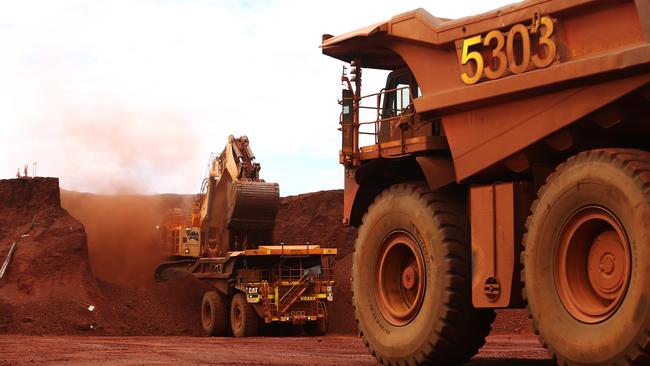China threatens ‘zero tolerance’ in quest to push down commodity prices
Iron ore futures and Australian mining stocks have taken another hit as Chinese authorities ramp up their rhetoric on high commodity prices.

Iron ore futures and Australian mining stocks have taken another hit as Chinese authorities ramp up their rhetoric on high commodity prices in an effort to jawbone down the price iron ore, steel, copper and other key commodities.
China’s powerful National Development and Reform Commission called in key government departments at the weekend to “remind” key commodity businesses against market manipulation, and that authorities would take a “zero tolerance” approach to breaches of market rules, according to an English-language translation of an NDRC statement.
“The meeting called on the relevant key enterprises to improve their position, establish a sense of the overall situation, actively fulfil their social responsibilities, promote the co-ordinated development of upstream and downstream industries, and maintain a good ecology of the industry,” the statement said.
“The meeting made it clear that the next step, the relevant regulatory authorities will closely follow and monitor commodity price trends, strengthen the joint supervision of commodity futures and spot markets, ‘zero tolerance’ for illegal acts, continue to increase law enforcement inspection efforts, check abnormal transactions and malicious speculation, resolutely and severely investigate and punish in accordance with the law to reach the implementation of monopoly agreements, spread false information, raise prices, hoarding odd and other illegal acts.”
Falls in the iron ore price look set to continue with futures in Singapore and China still in free fall on Monday after Chinese authorities increased export tariffs for some steel products last week, and cut import tariffs on scrap metal in an effort to put downwards pressure on iron ore prices.
The most active contract traded on China’s Dalian futures exchange was down 5.2 per cent at $US164.59 a tonne at 6pm (AEST), after hitting $US158 in intraday trading, its lowest levels since April 15. Singapore iron ore futures tumbled 4.6 per cent to $US182.85 and hit their lowest mark since April 30 in the day’s trading.
Iron ore prices remained on the slide last week, with S&P Global Platts saying its benchmark iron ore index fell $US10.75 or 5.1 per cent to $US200.10 a tonne on Friday.
But the latest data from Worldsteel suggests the iron ore price is at least partly underpinned by rising demand, with monthly production figures supplied by Worldsteel members showing April output of 169.5 million tonnes of crude steel in April as strong margins drove mills to increase supply, helping drive iron ore prices to record highs.
Global steel output in April was marginally higher than the 169.2 million tonnes produced in March, but a 23.3 per cent lift on April 2020, when industrial hubs were idled as the pandemic took hold and governments used national lockdowns to prevent its spread.
Worldsteel said Chinese production rose from 94 million tonnes in March to 97.9 million tonnes, and 13.4 per cent above the monthly figure from a year ago.
But the record steel mill margins of a few weeks ago are falling rapidly, suggesting recent falls in the iron ore price may also be sustained.
CBA analyst Vivek Dhar said on Friday that falling steel prices were undermining steel mill margins in China, estimating they are now down as much as 60 per cent from record levels reached on May 12, to $US111 to $US116 a tonne.
China’s ban on Australian coking coal is partly to blame for tighter margins, with Mr Dhar noting that Chinese mills are paying $US275 a tonne for imported premium coking coal, around double the price of Australian coal at the export terminals.
“We think China’s steel mill margins will need to fall to encourage policymakers to lift the unofficial ban on Australian coking coal at least. While China’s steel mill margins have retreated quite steeply in the past week, it’s still a long way off from loss‑making levels that will possibly be the catalyst for policy change,” he said.
Mining stocks closed well down on Monday, with BHP down 88c, or 1.8 per cent, to $46.87. Rio was off $2.62 to $119.50, with Fortescue Metals Group down 93c or 4.2 per cent to $21.37.
Base metals stocks were also down, with OZ Minerals off $1.18, or 4.6 per cent, to $24.50, and South32 closing 5c lower to $2.82, off 1.7 per cent.






To join the conversation, please log in. Don't have an account? Register
Join the conversation, you are commenting as Logout